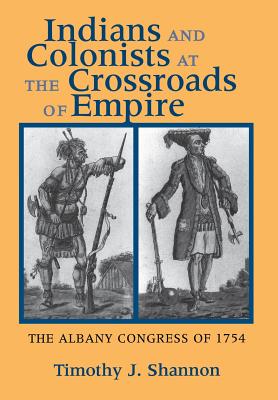

 Cornell University Press
Cornell University Press
Indians and Colonists at the Crossroads of Empire


Key Metrics
- Timothy J Shannon
- Cornell University Press
- Hardcover
- 9780801436574
- 9.35 X 6.35 X 0.9 inches
- 1.19 pounds
- History > United States - Colonial Period (1600-1775)
- English
 Secure Transaction
Secure TransactionBook Description
On the eve of the Seven Years' War in North America, the British crown convened the Albany Congress, an Anglo-Iroquois treaty conference, in response to a crisis that threatened imperial expansion. British authorities hoped to address the impending collapse of Indian trade and diplomacy in the northern colonies, a problem exacerbated by uncooperative, resistant colonial governments.
In the first book on the subject in more than forty-five years, Timothy J. Shannon definitively rewrites the historical record on the Albany Congress. Challenging the received wisdom that has equated the Congress and the plan of colonial union it produced with the origins of American independence, Shannon demonstrates conclusively the Congress's importance in the wider context of Britain's eighteenth-century Atlantic empire. In the process, the author poses a formidable challenge to the Iroquois Influence Thesis. The Six Nations, he writes, had nothing to do with the drafting of the Albany Plan, which borrowed its model of constitutional union not from the Iroquois but from the colonial delegates' British cousins.
Far from serving as a dress rehearsal for the Constitutional Convention, the Albany Congress marked, for colonists and Iroquois alike, a passage from an independent, commercial pattern of intercultural relations to a hierarchical, bureaucratic imperialism wielded by a distant authority.
Author Bio
Professor Shannon teaches Early American, Native American, and British history. His most recent book is Indian Captive, Indian King: Peter Williamson in America and Britain (Harvard University Press, 2018), which was awarded the 2019 Frank Watson Book Prize for best book in Scottish History.
He is also the author of Iroquois Diplomacy on the Early American Frontier (Penguin, 2008) and Indians and Colonists at the Crossroads of Empire: The Albany Congress of 1754 (Cornell, 2000), the latter of which won the Dixon Ryan Fox Prize from the New York State Historical Association and the Distinguished Book Award from the Society of Colonial Wars.
His other books include Going to the Source: The Bedford Reader in Early American History, 5th edition (Bedford/St. Martin’s Press, 2020); Atlantic Lives: A Comparative Approach to Early America, second edition (Routledge, 2019); The Seven Years’ War in North America: A Brief History with Documents, (Bedford, 2014); and American Odysseys: A History of Colonial North America, co-authored with David Gellman (Oxford, 2014).
His work has been supported by fellowships from the National Endowment for the Humanities, the John Carter Brown Library, and the Huntington Library. His current project examines Benjamin Franklin’s relations with and writings about Native Americans.
source: Gettysburg College
Videos
No Videos
Community reviews
Write a ReviewNo Community reviews